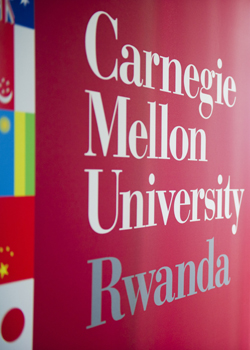Press Release: Carnegie Mellon Students in Rwanda Experience International Internship Success
Contact: Chriss Swaney / 412-268-5776 / swaney@andrew.cmu.edu
 PITTSBURGH—An international internship is a first-class ticket to success as more global companies seek workers armed with innovative problem-solving skills, resiliency and adaptability to new cultures and business practices.
PITTSBURGH—An international internship is a first-class ticket to success as more global companies seek workers armed with innovative problem-solving skills, resiliency and adaptability to new cultures and business practices.
Twenty-three students from the CMU-Rwanda Master of Science in Information Technology (MSIT) program crisscrossed Africa this summer plying their tech skills at companies ranging from IBM and Microsoft to Visa and Marriott.
"Every CMU-R student should aspire to have an internship in a Fortune 500 company because it is the best eye-opening world-class experience I have ever received, and it has inspired my dreams of tomorrow," said Kevin Rudahinduka, who completed his summer internship at Visa in South Africa.
Rudahinduka, a student in CMU's new information technology master's degree program in Kigali, Rwanda, joins more than 40,000 undergraduate and graduate students worldwide participating in summer internships to hone work skills and develop job prospects. More than 60 percent of college seniors complete some kind of professional internship before graduation, according to the National Association of Colleges and Employees' Class of 2013 study, and most of the students in CMU's engineering master's degree programs work as industry interns for a summer.
"As more companies set up shop in Africa, Asia and the Middle East, we see our students as invaluable resources to improve the region's economic growth," said Michel Bezy, associate director at CMU-Rwanda and a distinguished service professor in the Engineering and Public Policy Department at CMU. In 2011, CMU became the first U.S. university to offer graduate engineering degree programs in Rwanda, a tech-savvy East African country building a knowledge-based economy.
Already, more than 23,000 tourists yearly visit the land-locked East African nation to get a glimpse of the famed mountain gorillas, a 90-minute drive from the Rwandan capital of Kigali. The recent influx of tourists and global business has spurred a need for a highly skilled workforce in information and communication technology.
"We see these internships as an important part of our educational package because operating in a global market requires students who are familiar with international business acumen. An international internship is a win-win, because leading companies get to see new talent they may want to hire and the students learn from working in different countries and new environments," said Bruce Krogh, head of the CMU-Rwanda program and a professor of electrical and computer engineering. In the fall of 2014, CMU-Rwanda will complement the MSIT degree with an additional master's degree program in electrical and computer engineering.
CMU-Rwanda's multidisciplinary curriculum, which spans everything from mobile applications, information security and networking to software management, was put to good use this summer as students applied classroom work to business needs.
Alain Shema, a CMU-Rwanda intern at IBM in Kenya, is working to improve advertising platforms in public transportation buses and creating a curriculum for secondary school students that will enable them to collect weather measurements to help monitor the effects of climate change.
"At IBM, I got to work with incredibly smart people on exciting projects with the potential to transform the education systems and the informal business sector of the African continent," Shema said.
Other IBM interns like Andrew Kinai praised the internship program for its diversity. "I got to work with teams in Japan, India and the U.S. supporting me in my project. This diversity creates a good environment to learn from skilled individuals with diverse backgrounds," Kinai said. "I am working on a cognitive hub project, which is basically an African tribal knowledge project, where we are developing a tool which will help to understand African continent complexities based on different parameters."
Bezy said Kinai's project is important because it will help us better understand Africa and the link between tribal knowledge and innovation/technology adoption.
In 2007, Rwanda was named East Africa's leading information technology nation by the United Nations and has continued to spearhead IT development in the region.
"Rwanda has invested heavily in technology infrastructure, and prioritized the development of IT skills in the national education agenda, and our internship program is an excellent addition to those ongoing efforts for Rwanda to become a knowledge-based economy by 2020," Krogh said.
For additional information about the CMU-Rwanda internship program, see http://www.cmu.edu/rwanda/industry-connections/Internships/index.html
###